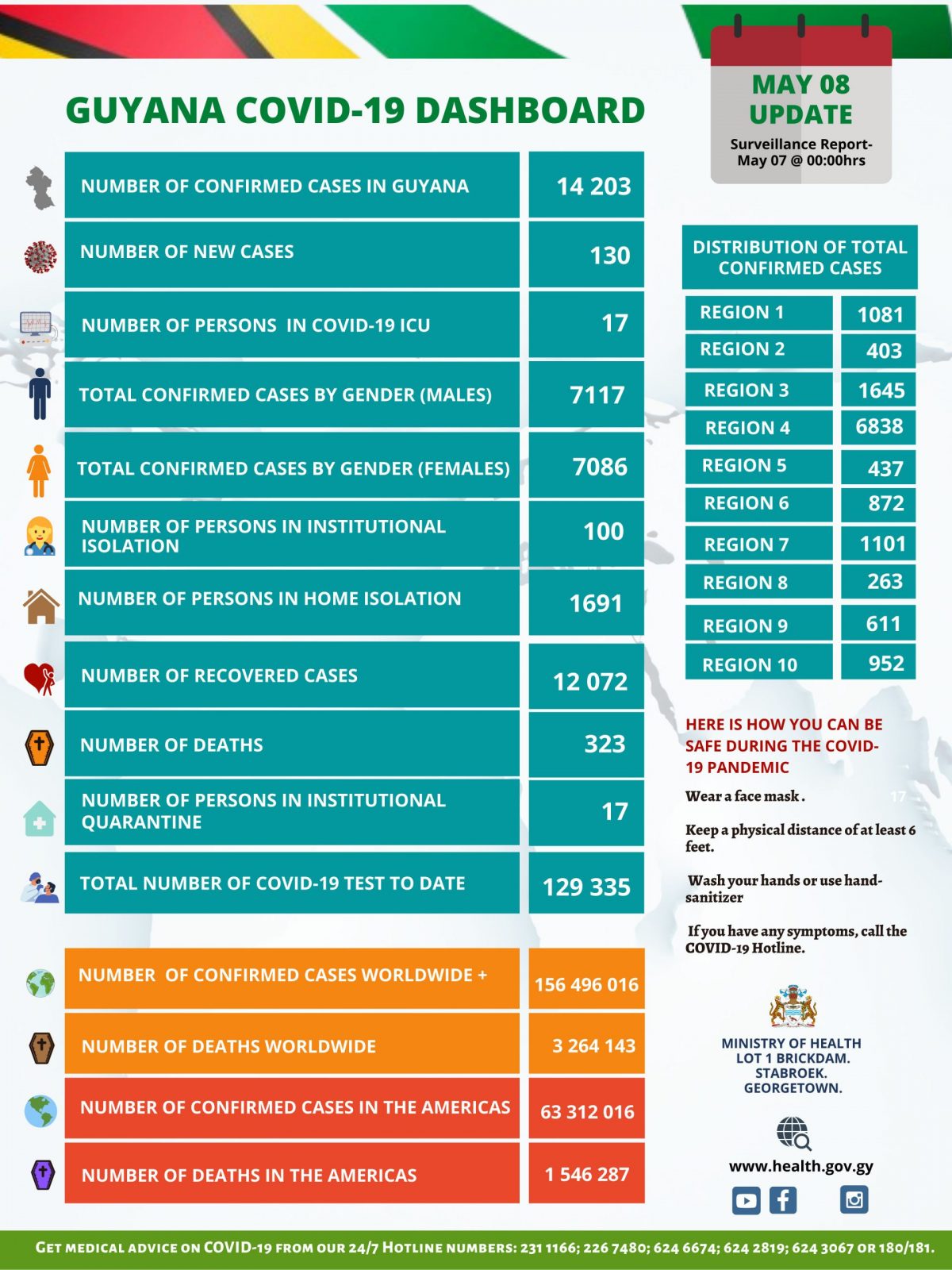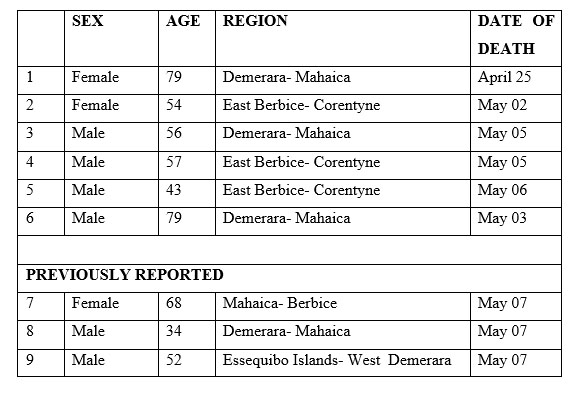A total of nine more COVID-19 deaths were confirmed by the Ministry of Health (MoH) on Saturday, increasing the country’s death toll from the virus to 323.
According to the MoH, the deaths of the six men and three women occurred between April 25th and May 7th.
Three deaths that occurred on Friday were confirmed on Saturday morning by the ministry, which subsequently announced the confirmation of the six other deaths, which occurred between April 25th and May 6th. The six men ranged in age from 34 to 79, while the women ranged in age from 54 to 79. Four of them were from Region Four, three from Region Six, one from Region Five and the other from Region Three.
The confirmation of the deaths comes amidst a continued rise in the number of infections being reported daily, as well as a significant rise in the number of deaths over the past two months.
Up to yesterday, the COVID-19 dashboard revealed 130 new cases from 509 tests, taking the total number of cases in the country recorded so far to 14,203. Seventy-two of the new cases are from Region Four, 18 from Region Ten, 14 from Region Three, 10 from Region Six, 8 from Region Seven, 7 from Region Five and 1 from Region Nine.
The dashboard also showed that there were 17 persons in the Intensive Care Unit, 100 in institutional isolation, 1,691 in home quarantine and 17 in institutional quarantine. Some 12,072 persons who were infected with the virus have recovered.
Based on the dashboards from last Sunday to yesterday a total of 799 cases were confirmed from a total 5, 455 tests conducted.
No official confirmation
While the growing number of cases and deaths have sparked fears over a presence of a variant of the virus, up to Friday, Health Minister Dr Frank Anthony said arrangements were still being worked out to send samples overseas to be test for variants.
“We are still trying to work out those arrangements to see which labs would accept the samples and so forth, so we are yet to finalise those arrangements,” he said during his daily COVID-19 update.
In March, Anthony had announced a partnership with the Icahn School of Medicine at Mount Sinai in New York, USA. At that time, he had noted that the school has a department that has been conducting genetic sequencing research and has been working with a number of countries to test samples. Anthony had said that the ministry intended to send samples to the school soon.
However, on Friday he confirmed that no samples had been sent through the partnership with the school.
Anthony noted that when samples are sent to the National Public Health Reference Laboratory, they are able to determine whether someone is COVID-19 positive but also store those samples to be able to perform other tests if necessary.
“So we do have samples at the lab that we can historically check to see what it was and so forth, so sampling is not the problem it’s getting access to a facility that can do the sequencing and that we are still working on that,” he said.
Further he noted that while authorities are exploring options, the Caribbean Public Health Agency (CARPHA) is one possibility. The minister added that with most other facilities they would have to pay to have sequencing done, while with CARPHA the initial arrangement would see the process being done free of cost.
Previously Anthony had said samples sent to CARPHA to test for variants returned negative. Since then, infections and deaths appear to have spiked.
No vaccinated fatalities
Meanwhile, in response to a question posed by Stabroek News, Anthony noted that none of the recent fatalities are persons who have received their vaccines. He said the relevant authorities have been monitoring the persons who have been vaccinated along with deaths.
“We haven’t seen anyone who has received those two doses and dying from the infection, so that’s a very positive thing.”
He added that the ministry has been constantly checking to ascertain whether persons who have passed as a result of the virus have received doses of the vaccine. It has also been engaged in monitoring persons who received vaccines to see whether they have had any side effects.
Anthony reiterated that there is the possibility of persons getting infected with the virus after receiving their first dose.
“…If they get infected, you don’t anticipate they will have the severe form of the disease,” he noted before adding that local health authorities have not seen any adverse outcomes.
Treatment guidelines
As it relates to the treatment of patients at the COVID-19 Intensive Care Unit (ICU), Anthony noted that just under two months ago, the ministry had completed training for the standardised guidelines for treatment with clinicians in the country.
“In every region we brought out people and had this training. It was a three day training session so those are the guidelines that we are currently using”, he said while adding that the management for cases on each level from mild to critical varies.
He went on to say that the doctors enlist the use of drugs that would reduce the viral load in the patients and noted that Remdesivir is still being used. The minister indicated that a mixture of some steroids are still being used on patients to be able to reduce a hyper-inflammatory reaction and also prevent organ failure.
“So we have those two medications [Remdesivir and Dexamethasone], that’s the hallmark of how we treat our patients and of course all the patients who require oxygen because they are having breathing difficulties… oxygen is one of the mainstays of therapy,” he added.
Anthony also revealed that convalescent plasma therapy is still being used as part of the treatment of patients here. This, he said, is used for some of the very critical patients in the ICU. According to the health minister, a lot of the medication that is being used for the treatment has been bought by the government in ample supply.







